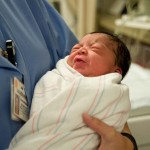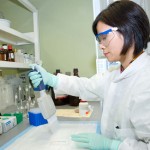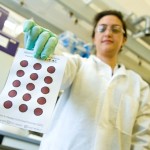You are here
Protected From Birth: Newborn Screening Saves Lives and Futures
This story was gathered from David Snyder's visit to CDC. David reports on CDC programs in action for the CDC Foundation.
For new parents the world over, the birth of a healthy child is a joy they remember throughout their lives. For some, however, that joy is tempered by serious health problems that arise from disorders like phenylketonuria, sickle cell disease or hypothyroidism. Fortunately for thousands of babies born in the United States each year, those treatable diseases are caught and diagnosed within days of birth, thanks in large part to the work of the newborn screening laboratory program at the Centers for Disease Control and Prevention.



“Newborn screening is the most successful lab-based prevention program in public health,” says Dr. Robert Vogt, principal investigator of the Newborn Screening Translation Research Initiative (NSTRI).
Virtually all babies born in the United States are tested for an array of treatable, but potentially deadly, conditions within 48 hours of birth. Blood samples collected by a simple “heel stick” are sent to one of more than 70 newborn screening labs across the country for analysis. Testing in these labs is routinely evaluated by CDC’s Newborn Screening and Molecular Biology Branch, which operates the only comprehensive program in the world for assuring the quality of newborn screening tests. The reach of the CDC program also extends to over 450 labs in more than 60 countries.
Currently, early detection by laboratory tests helps prevent death and disability from dozens of disorders. Early identification of these disorders gives babies a healthy start and dramatically reduces health care costs associated with treatment of lifelong debilitating conditions.
For the future, the CDC research group is working to identify new tests to add to the mix. Dr. Vogt boils down the research conducted by his program into a simple summary saying, “The purpose of this group is to anticipate screening tests that are not now being conducted.” The CDC Program was instrumental in expanding the recommended panel of newborn screening tests to include Severe Combined Immune Deficiency (SCID), known more commonly as the Boy in the Bubble Syndrome. The screen is now being piloted at labs in Wisconsin and Massachusetts, and thus far more than 200,000 babies have been screened for the syndrome. The first newborn with SCID was identified just this year. The screening test should soon become routine throughout the United States, adding yet another layer of protection for newborns.
Gathered with his research colleagues near their lab at CDC, Dr. Vogt is quick to recognize the role of the CDC Foundation. “We now have five major areas of investigation that are supported in one way or another by the CDC Foundation,” he says. “In some cases it is direct funding support and in other cases there are partnerships that are in-kind. We use the CDC Foundation to ‘do more, faster.’ That motto really applies.”
Dr. Robert Vogt (right), Research Chemist at the Newborn Screening and Molecular Biology Branch of the CDC, stands with the clinical scientists who together are working on developing new tests to be included in newborn screening to help doctors diagnose and treat congenital conditions in newborns. Pictured with Vogt from left to right are: Francis Lee, Hui Zhou, and Golriz Yazadanpanah.
PROGRAM SNAPSHOT
Newborn Screening Translation Research Initiative Purpose:
To improve four major areas of newborn screening: 1) developing new screening methods for specific diseases, 2) integrating state public health laboratories in the translation process through collaborative field studies, 3) expanding the global reach of newborn screening, and 4) adapting innovative technologies for screening and quality assurance.
Funding Partners:
Genzyme Corporation, Applied Biosystems, Brown University, The Miriam Hospital, National Alliance for Autism Research, New York State Department of Health, The Evanosky Foundation, USA Medical Research and Materiel Command
Program Partners:
Jeffrey Modell Foundation, Johns Hopkins Bloomberg School of Public Health, Kennedy Krieger Institute, Medical College of Georgia, The University of Texas at San Antonio, University of Washington, Washington State Department of Health, Wisconsin State Laboratory of Hygiene, CDC's Division of Laboratory Sciences
CDC Principal Investigator:
Robert Vogt, Ph.D. , research chemist, CDC's Newborn Screening and Molecular Biology Branch
CDC Foundation's Role:
Partnerships forged through the CDC Foundation have enabled CDC's newborn screening program to bring on fellows to help conduct research; to use specialized, state-of-the-art equipment through in-kind gifts; and to address new diseases through newborn screening research.
